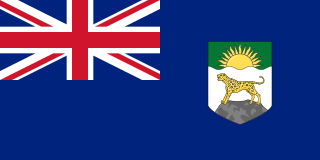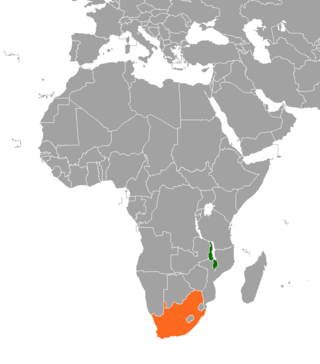 | |
Malawi | United Kingdom |
|---|---|
Malawi and the United Kingdom have formal diplomatic relations. They are both Commonwealth countries.
 | |
Malawi | United Kingdom |
|---|---|
Malawi and the United Kingdom have formal diplomatic relations. They are both Commonwealth countries.
| | This section needs expansion. You can help by adding to it. (July 2022) |
British influence in modern-day Malawi began through a system of foreign influence when Nyasaland became a British protectorate under a colonial administration. The Queen of Great Britain became the Queen of Nyasaland. Nyasaland gained independence on 6 July 1964 and has since known as Malawi.
Malawi has had diplomatic relations with United Kingdom during the post-colonial era.
Malawi and the UK found themselves in a diplomatic row in 2012 that resulted in the mutual expulsion of their envoys. Bingu wa Mutharika expelled British High Commissioner Fergus Cochrane-Dyet for calling him "arrogant" and "intolerant" after a leaked cable was published in The Nation newspaper. [1] The United Kingdom in return expelled acting High Commissioner Flossie Gomile-Chidyaonga [2] and revoked her invitation to the royal wedding of the Duke and Duchess of Cambridge. Relations were restored after Joyce Banda came into power.

Malawi, officially the Republic of Malawi and formerly known as Nyasaland, is a landlocked country in Southeastern Africa. It is bordered by Zambia to the west, Tanzania to the north and northeast, and Mozambique to the east, south, and southwest. Malawi spans over 118,484 km2 (45,747 sq mi) and has an estimated population of 19,431,566. Malawi's capital and largest city is Lilongwe. Its second-largest is Blantyre, its third-largest is Mzuzu, and its fourth-largest is Zomba, the former capital.

Nyasaland was a British protectorate located in Africa that was established in 1907 when the former British Central Africa Protectorate changed its name. Between 1953 and 1963, Nyasaland was part of the Federation of Rhodesia and Nyasaland. After the Federation was dissolved, Nyasaland became independent from Britain on 6 July 1964 and was renamed Malawi.

Hastings Kamuzu Banda was the leader of Malawi from 1964 to 1994. He served as Prime Minister from independence in 1964 to 1966, when Malawi was a Dominion/Commonwealth realm. In 1966, the country became a republic and he became the first president as a result, ruling until his defeat in 1994.

In a referendum on 21 May 2006, the people of Montenegro opted to leave the State Union of Serbia and Montenegro. This result was confirmed with a declaration of independence by the Montenegrin parliament on 3 June 2006. It simultaneously requested international recognition and outlined foreign policy goals.

Sir Alfred Sharpe was Commissioner and Consul-General for the British Central Africa Protectorate and first Governor of Nyasaland.

In the Commonwealth of Nations, a high commissioner is the senior diplomat, generally ranking as an ambassador, in charge of the diplomatic mission of one Commonwealth government to another. Instead of an embassy, the diplomatic mission is generally called a high commission.

Malawian-South African relations refers to the bilateral relationship between Malawi and South Africa. South Africa's first formal relationship with an independent African country was established with Malawi, beginning in 1967.

The Federation of Rhodesia and Nyasaland, also known as the Central African Federation (CAF), was a colonial federation that consisted of three southern African territories: the self-governing British colony of Southern Rhodesia and the British protectorates of Northern Rhodesia and Nyasaland. It existed between 1953 and 1963.

The relationship between the Republic of Korea and the United Kingdom of Great Britain and Northern Ireland spans from the 19th century to the present day. Although the Republic of Korea gives 18 January 1949 as the date of the establishment of formal relations with the United Kingdom, diplomatic ties go back to the United Kingdom–Korea Treaty of 1883. British military participation in the Korean War during the 1950s was significant, but relations between the two countries at the time were described as "tenuous", with relatively little known about each other. Commercial and trade relationships grew rapidly during the 1970s. During the Asian Financial Crisis in the late 1990s, Queen Elizabeth II made a state visit to South Korea, which was well received at a time of crisis in the country. Today, there are strong economic and diplomatic links between the two countries.
The Nation is a newspaper based in Blantyre, Malawi, owned by Nations Publications Limited. It began distribution on 26 July 1993, and became a daily newspaper on 11 July 1994, coming out on Mondays through Fridays. Its sister newspaper, Saturday Nation, now called Weekend Nation, was launched in 1995.

Fergus Cochrane-Dyet is a British diplomat who served as High Commissioner to Zambia from April 2016 until August 2019, being succeeded by Nicholas Woolley. In 2011, while serving as High Commissioner to Malawi, he was declared persona non grata and expelled from the country because of controversial comments he made in a leaked diplomatic cable.

Flossy Gomile-Chidyaonga was the Deputy High Commissioner of Malawi to Britain and Tanzania. She was involved in a diplomatic spat between Malawi and the United Kingdom in 2011 due to a leaked diplomatic cable, and was expelled. She was the Malawian High Commissioner to Tanzania.

Saint Kitts and Nevis and the United Kingdom have a long history of colonial activity and later diplomatic relations.

The Consulate-General of the United Kingdom in Saint Petersburg was part of the diplomatic mission of the United Kingdom in the Russian Federation, before it was closed down in 2018. It was located on Lafonskaya Street in Tsentralny District.
William Nigel Wenban-Smith CMG is a British former diplomat.

The history of the Jews in Malawi formerly known as Nyasaland, and part of the former Federation of Rhodesia and Nyasaland.